Honors college Dean retires
After 23 years as the Director of the Collegium V Honors Program and seven years as dean of the Hobson Wildenthal Honors College, Edward Harpham will be stepping down from his administrative post, effec
tive January 1. Harpham, a political science professor, will be taking a year-long sabbatical, after which he intends to return to the University in a faculty position. Douglas Dow, current associate dean of the Honors College, will assume the position of Interim Dean of the Honors College while
the University conducts a national search for a permanent replacement.
“I’m excited to be turning things over to [Dow]; it couldn’t go to a better person,” Harpham said. “This is a personal decision, for family reasons, but I’m very excited because we’ve got to keep building this program, and it’s good for a new generation
to take over that project. The Honors College was created to promote excellence across the board at the University. We’ve got a good base to build from, and I hope it continues to grow. And Dow is a great person to be leading that. There’s a lot of changes coming, and I think they’re pretty exciting.”
The Mercury tracked Student Government’s progress with President and political science senior Ryan Short’s and Vice President and business administration sophomore Imaan Razak’s campaign promises. The following is our breakdown:
Promise 1: Uplift student concerns around UTD’s continued COVID-19 response Update: - Met with UTD administration to address student concerns over inaccuracies in COVID-19 cases on UTD’s COVID-19 dashboard at the beginning of the fall semester. Dashboard was updated with accurate COVID-19 case data. - Met with the Dean of Students
Office, which handles contact tracing, to discuss student concerns around testing, vaccination numbers and general COVID-19 updates. - Passed de-densification, attendance policy, seating chart and lecture recording resolutions centering around the classroom response to COVID-19. Polled students for de-densification and classroom policy resolution to gauge desire for extending de-densification and student health concerns with in-person instruction, of which the majority voted in favor of de-densification and expressed health concerns with face-to-face lectures.
The resolutions ultimately did not pass through the Academic Senate to be implemented into the University.
Promise 2: Strengthen SG’s commitment to student advocacy
SG fall campaign promise check-in Spring COVID plan Spring intramurals announcement


eventually return to “normal” operations.

As finals conclude and students set their eyes on returning to campus next semester, UTD is doing the same with regard to its COVID-19 protocols.


By and large, Vice President and Chief of Staff Rafael Martín says that the current plan is to treat the spring semester as they had planned this fall before the Delta variant was introduced to the DFW area. This means that UTD will essentially return to the current status quo — full density in-person classes, Daily Health Checks, encouraged mask-wearing and random testing across campus — unless circumstances dramatically change over the next month. If positive trends continue into the spring as boosters become more accessible, the University may
“The plan right now — which, of course, big asterisk, is subject to change — is to come back full density just as we are now at the start of the spring semester,” Martín said. “We will obviously be monitoring local cases throughout the break, and if things start to take a turn for the worse, and especially if we start to see
After a semester of limited operations, intramural sports will return to full force for the spring semester with a lineup that includes basketball, FIFA and wiffleball leagues as well as special events like table tennis, Overwatch and a version of Battleship played on canoes in the AC pool.

Ben Piper, associate director of programs for UREC, said that the biggest change from the fall is that basketball and soccer, the two primary leagues, will be back in their full formats — a five-week regular season and twoweek playoff. Piper is also working to bring more of the one- and two-day tournaments and special events, which he said were popular during the fall semester.
“You always run into things like weather if we’re working outside, or sometimes life happens across campus and we have to make adjustments,” Piper said. “But I think the students, in those situations where we had that
UTD’s cross country teams concluded the year on a high note and now turn their focus to preparing for the track season.

Beset by a number of difficulties, including injuries to Graeme Maclean – the defending ASC 1,500 and 800m champion – both the men’s and women’s cross country teams
fell short of the ASC conference title this year, although head coach Danielle Kcholi said she was proud of how the teams performed given the circumstances. But, in the last meet of the season, the men’s team put up its best NCAA divisional meet performance in program history, despite moving to a stronger division this year.
“Moving into the new region in the west, that was definitely an eye-opening experi-
ence,” Kcholi said. “To put it all in perspective and realize we went to a region where two of the teams were in the top 10 at nationals last year – and one was the national champions –it was a really good experience for everyone to see where we eventually want to be.”
Now, UTD’s runners turn their attention to the track season as they begin individually
December 6, 2021 facebook.com/theutdmercury | @utdmercury THE MERCURY UTDMERCURY.COM
-
TYLER BURKHARDT Editor-in-Chief
TYLER BURKHARDT Editor-in-Chief
TYLER BURKHARDT Editor-in-Chief
DOUGHERTY
and Arts Editor Cross country team prepares for spring Winter Activities pAge 5 esports needs support pAge 9 ed boArd's fAvorite Articles pAge 6 CASEY RUBIO | MERCURY STAFF ALESANDRA BELL | GRAPHICS EDITOR DAVE WESTER | COURTESY THAOVY NGUYEN | MERCURY STAFF Men and women's teams retrain for track season after eventful fall semester Spring protocols won't differ greatly from the fall's SEE PROMISES, PAGE 10 SEE PROCEDURES, PAGE 10 SEE INTRAMURALS, PAGE 10 SEE TRACK, PAGE 10
FATIMAH AZEEM Opinion Editor
LAUREN
Life
Tyler Burkhardt editor@utdmercury.com
Managing Editor Ben Nguyen managingeditor @utdmercury.com (972) 883-2287

Graphics Editor Alesandra Bell graphics@utdmercury.com
Photo Editor Anna Phengsakmueang photo@utdmercury.com
From The Mercury Archives: Dec. 04, 1995 Student Union construction, recreation center planning continue


New buildings on campus include the addition to the Student Union, currently under construction, and the proposed recreational/events center.“The recreation area (of the Student Union addition) will be scaled-up to include five pool tables, ping pong tables, air hockey, a typing/computer room, a video games room and a big-screen TV,” said Gloria Williams, coordinator of the Student Union. “The project is on schedule and looking good.” She added that the Info Depot will move upstairs and a control center will be established downstairs. Eateries in the food court are still being determined. “The structure is two-thirds complete,” said Frank Van Herpe, job superintendent for general contractor Haws and Tingle. “Precast is scheduled to be done by mid-March, the glass in early April and move-in by June. The renovation of the existing building should be finished by September.”Williams and Van Herpe agree that bad weather is the main intangible that could slow the schedule.The committee for the
second construction project is making decisions to determine what facilities can fit within the budgeted funds for the recreational/events center. This project’s committee includes Robert Lovitt, vice president of Business Affairs; Darrelene Rachavong, director of Student Life; Del Overstreet, director of Physical Plant; Mary Walters, coordinator of Recreational Sports; Darrin Carpenter, Recreational Sports specialist; Gregory McNicol, planning project manager from the Office of Facilities Planning and Construction of the UT System; Jason Sadler, SGA president; and James Sanders, SGA senator. Additional committee members include David Marsee, project manager from McCune Partners Inc. (MPI), and Joe Hunsaker, swimming pool specialist with Councilman/Hunsaker. Jack Patton and Al Oberlander of RDG Bussard Dikis of Des Moines and Omaha are the lead consultants working with MPI. “RDG is nationally recognized as experts in recreational sports complexes in this range ($10 million),” said Marsee. “We proposed using them to UTD, and they accepted.”“The recre-
ational/events center is an excellent tool for recruiting students,” McNicol said.

Maintaining open recreation for the students is a priority, Walters said. Additionally, physical education classes, intramural sports, NAIA, or possibly Division III NCAA teams, and sport clubs may use the center. Other ideas for the rec reational/events center include an indoor jog ging track above and around the perimeter of the basket ball court and a roller hockey court. “Given the popularity of Rollerblades,
it’s possible to make rollerhockey an intramural sport,” Sadler said. Rachavongsaid the roller hockey court could double as an indoor soccer arena. Current meetings on the recreational/ events center are at the critical stage, according to Lovitt. “I’m glad the students (Sadler and Sanders) have input,”
The Mercury is published on Mondays, at two-week intervals during the long term of The University of Texas at Dallas, except holidays and exam periods, and once every four weeks during the summer term. Advertising is accepted by The Mercury on the basis that there is no discrimination by the advertiser in the offering of goods or services to any person, on any basis prohibited by applicable law. The publication of advertising in The Mercury does not constitute an endorsement of products or services by the newspaper, or the UTD administration. Opinions expressed in The Mercury are those of the editor, the editorial board or the writer of the article. They are not necessarily the view of the UTD administration, the Board of Regents or the Student Media Operating Board. The Mercury’s editors retain the right to refuse or edit any submission based on libel, malice, spelling, grammar and style, and violations of Section 54.23 (f) (1-6) of UTD policy. Copyright © 2021, The University of Texas at Dallas. All articles, photographs and graphic assets, whether in print or online, may not be reproduced or republished in part or in whole without express written permission. THE MERCURY UTDMERCURY.COM Volume XLI No. 7 Media Adviser Chad Thomas chadthomas@utdallas.edu (972) 883-2286 Mailing Address 800 West Campbell Road, SU 24
Newsroom Student Union, Student Media Suite SU 1.601 The Mercury is a proud member of both the Associated Collegiate Press and the Texas Intercollegiate Press Association. Editor-in-Chief
(972)
Richardson, TX 75080-0688
883-2294
Copy Editor Sophie Boutouis copyeditor@utdmercury.com News Editor Nandika Mansingka news@utdmercury.com Web Editor Trevor Tomer web@utdmercury.com UTDPD Blotter VEHICULAR INCIDENT THEFT DRUGS & ALCOHOL OTHER MAP: UTD | COURTESY Life & Arts Editor Lauren Dougherty life@utdmercury.com November 20 • A UTD student reported a stolen bicycle at 2:04 p.m. near building 50. November 23 • A sexual assault was reported to PD on campus at 2:11 a.m November 10 • A student reported stolen clothing to PD from UV Phase 1 at 12:03 a.m. Outreach Editor Jacky Chao media@utdmercury.com Dec. 6, 2021 | The Mercury NEWS 2 Opinion Editor Fatimah Azeem opinioneditor@ utdmercury.com A Contributors Danielle Bell Manya Bondada Palak Dave Alexandra Ibarra Juhi Karnalkar Jamie Lin Elizabeth Nguyen Mia Nguyen Thaovy Nguyen Sihanya Rocha Casey Rubio Kaylee Scanlin Quinn Sherer B A C C B
Video Editor Ali Khan video@utdmercury.com
Boots Pennington Contributor
Right: A past schedule of UTD finals, published in the Dec. 04, 1995 issue of The Mercury.
Esports fall season recap
HIGHLIGHT PLAYER: Abraham "P3tal" Khan
This semester, the Overwatch team reached new heights with the new roster and renewed vigor. The addition of Chris "Bani" Benell to the coaching staff and Abraham "P3tal" Khan as a Contender's level hitscan dps along with other freshman players like Kashir "Kashir" Khan overall levelled up the team to contesting the top 3 in the nation. Throughout the semester, the team made the effort to integrate their freshman players, both into campus living and playing in the collegiate field, and their efforts paid off as the team quickly proved in both the NACE league and Overwatch Collegiate Homecoming that they were a force to be reckoned with. Near the end of the semester, there were some notable drop offs, as even though the team beat long-time rivals UNT in the NACE league, they finished top 8 at the Overwatch Collegiate Homecoming before getting a chance to duke it out against Redbird Esports. The fall is a build-up period for the team, and going into the spring players are confident that they'll be able to assert themselves into the top 3 before the end of the spring semester.


HIGHLIGHT PLAYER: Varun "_trey5" Siva
The Smash semester was mildly disappointing, but not for the individuals play level. Rather, CSL chose to pursue a singles-format tournament bracket, leading to there being less tournaments to compete in generally. So while in person competition returned locally in the form of singles tournaments ran by Freaks, the lack of organizers led to the continuation of online play for the main crew battle league, Collegiate Smash Brothers. In this, the team still shined, and with standout addition Varun "_trey5" Siva rounding out the team with a Minecraft Steve flavor, they never dropped a series in the Collegiate Smash Brothers playoffs. Unfortunately, this semester is the last for long-time coach Chaynen "Sun" Casas, and though the team will still be mostly intact otherwise, Sun's presence will be missed as one of the inaugural members of the Smash team.
This is by far the highlight of my collegiate experience, I'll never forget it and I don't regret anything.
— Chaynen "Sun" Casas, Smash Ultimate head coach

HIGHLIGHT PLAYER: Frederick "R1val" Dehner
The Rocket League team had a semester that didn't meet their goals, dropping out of the Western CRL playoffs in third and leaving the USO Experience Invitational earlier this weekend. That's not to say that they didn't play well, placing second in the regular season for the Western conference and generally improving their play over the fall and winter split. But the team's goals were to place amongst the top in the nation, and top 8 isn't good enough. One of the team's biggest strengths and weaknesses is in their mental momentum - if they secure an early lead in a series or bracket they tend to push the momentum to more wins. Lose hard early, and it becomes nearly impossible to see a comeback from behind. Head coach Kevin "Sporti" Vigil said that after being swept early into the CRL Western playoffs bracket, the team's mental state became difficult to recover even after picking up wins in the loser's bracket. Going into the spring split, they'll look to correct their mental issues and push for a top position in the collegiate scene alongside their newly added sub Frederick "R1val" Dehner.

HIGHLIGHT PLAYER: Ryan "YoojungHukiriLee" Pan
The League of Legends team has seen some shakeups this semester, with the team bringing on new players and playing with different roster setups throughout the semester. It's been a warm-up semester for the spring, and they'll be looking to gel together more and figure out how to play around players like jungler Ryan "YoojungHukiriLee" Pan and ADC Harold "Jraff" Bennet to pick up more wins once the official Riot Collegiate League of Legends season starts up. The introduction of the hextech and chemtech drakes in the preseason will be sure to shake up the meta again going into the new year, but it remains to be seen how it will affect collegiate play.
Dec. 6, 2021 | The Mercury ESPORTS 3
Photos courtesy of UTD Esports Graphics by Quinn Sherer
BEN NGUYEN Managing Editor




Dec. 6, 2021 | The Mercury 4 CASEY RUBIO | MERCURY STAFF PAT SAYS GOODBYE BURNT OUT WINDOW PAINS UNDERCOVER COMIC ARTIST HOLIDAY THINGS TO DO ON CAMPUS ALEXANDRA IBARRA | MERCURY STAFF QUINN SHERER | MERCURY STAFF KAYLEE SCANLIN | MERCURY
ELIZABETH NGUYEN | MERCURY STAFF JUHI KARNALKAR | MERCURY STAFF DOG DAYS
STAFF
GUESS THE HOLIDAY SONG
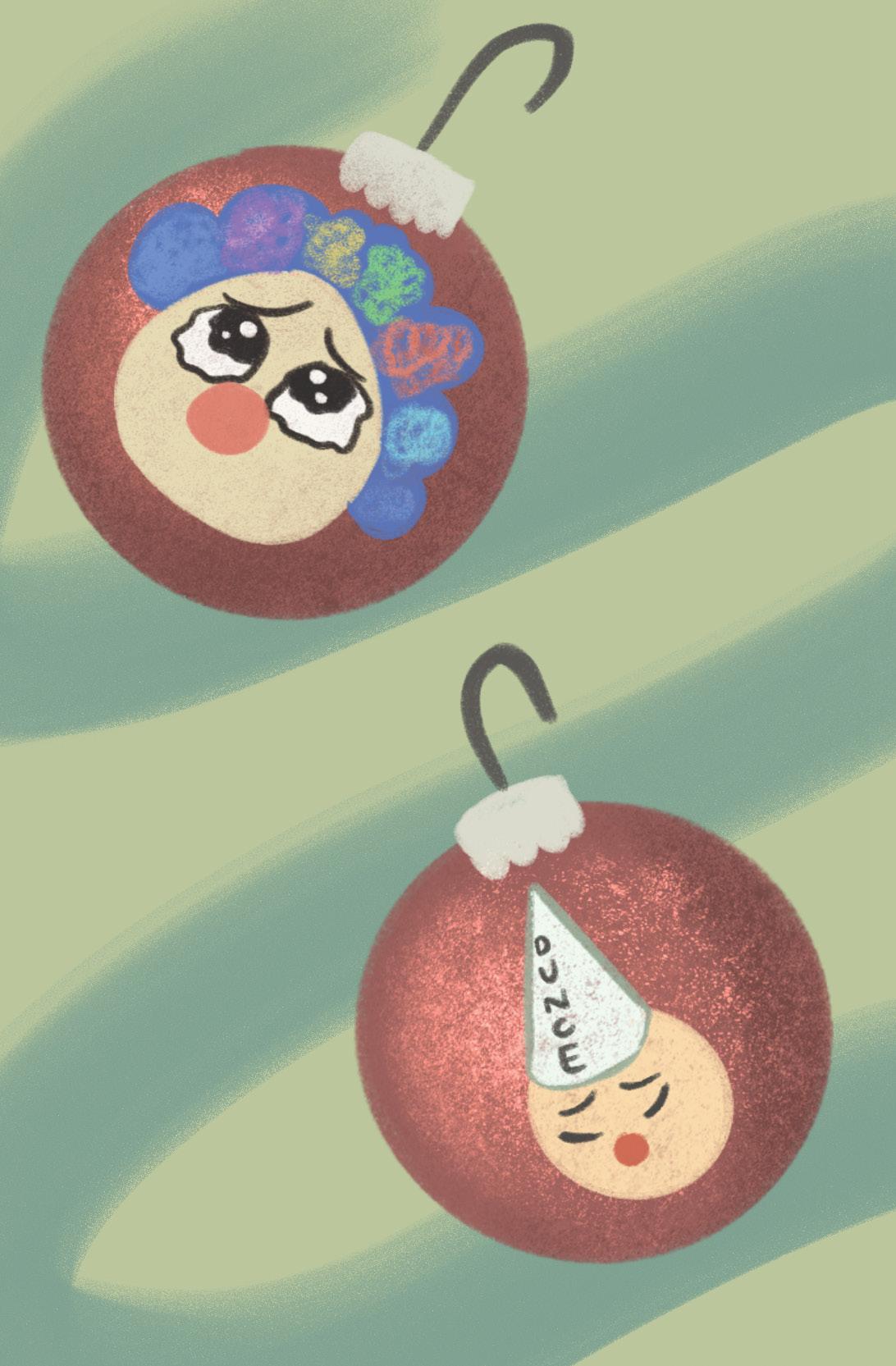
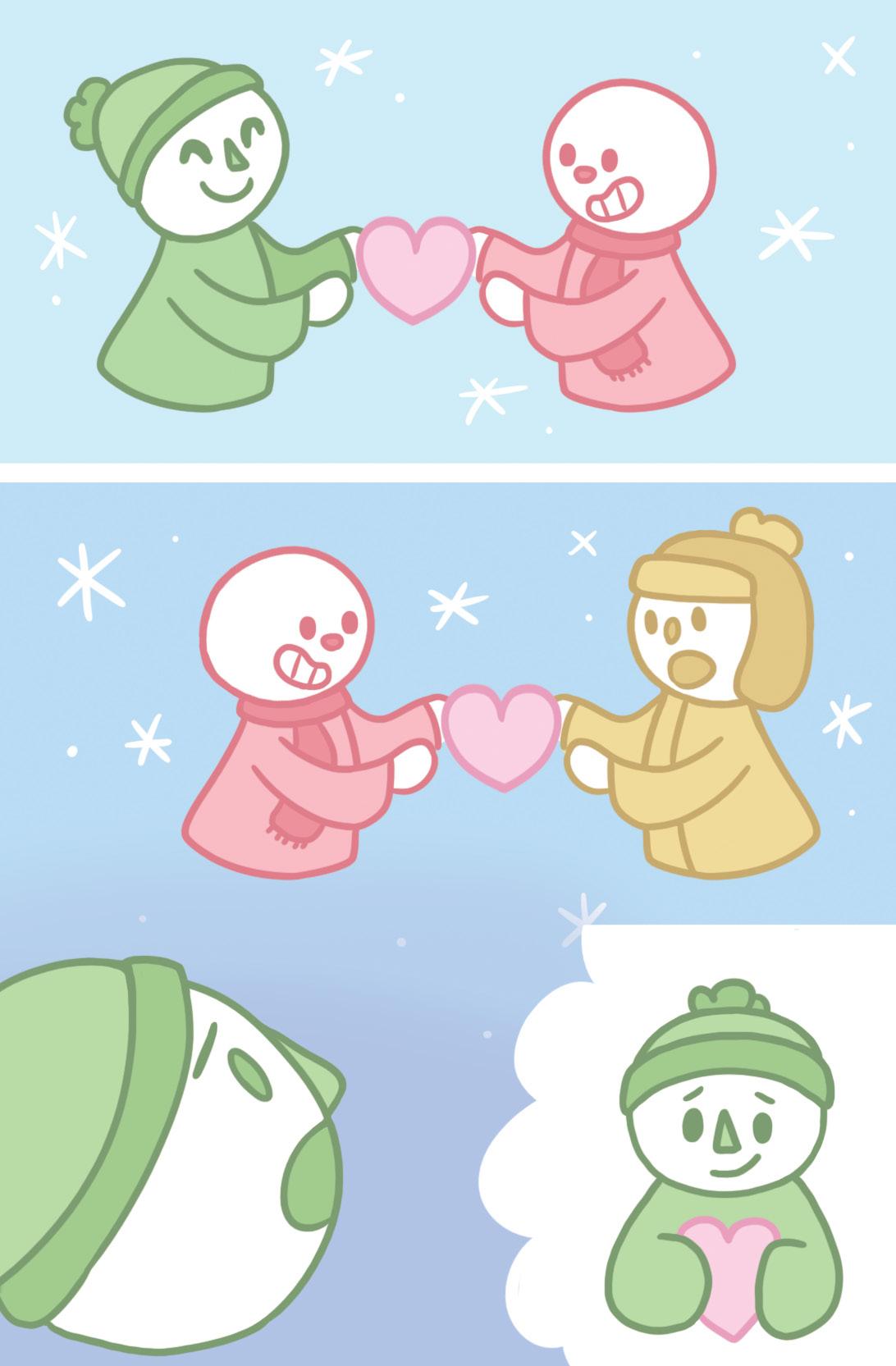
Each of these illustrations represents a song sung around the holidays. Use the word bank to match each illustration to its song.
SONG BANK
Santa Baby by Eartha Kitt
Need some help? Use the song bank to match song titles to the pictures above.

Last Christmas by Wham!
GRANDma got run over by a reindeer by elmo & patsy

JINGLE BELL ROCK BY BOBBY HELMS
Fool's Holiday by All time low Happy xmas (War is over) by John yoko

JUHI KARNALKAR | MERCURY STAFF QUINN SHERER | MERCURY STAFF ALESANDRA BELL | GRAPHICS EDITOR ELIZABETH NGUYEN | MERCURY STAFF DANIELLE BELL | MERCURY STAFF CASEY RUBIO | MERCURY STAFF
Dec. 6, 2021 | The Mercury COMICS&ACTIVITIES 5
Noteworthy news:

When Manya decided to look into a video showing an apparent delivery robot kidnapping by a group of students in Northside, nobody knew what to expect. However,
Life's legacy:
While I'm thankful we can meet people in person again with campus feeling mostly back to normal this semester, it was fun to look back on the
Grand theft tobor, Manya Bondada

some excellent investigative reporting, a one-of-a-kind layout and an unexpected resolution combined to make this one of our most memorable news stories of the year.
If you have ever wondered what might happen if you tried to steal a tobor yourself, or perhaps just wanted some insight into how UTD PD works, consider revisiting this story.
Minecraft, blind dates, a relationship app oh my!
Christine Jacob, Nandika Mansingka
creative ways UTD students formed relationships during the pandemic. It’s also perhaps a sign of just how much our world has changed that these vir-
tual projects are still going strong — the Minecraft server launched a new update in November, and Pop is now available to students nationwide.


Optimal opinion: A comma-n misunderstanding, Tyler Burkhardt

“I’d like to begin by thanking The Mercury’s most dedicated readers, Babe Ruth and President Biden.” Confused as to why a deceased baseball player and the President

Sporty selection:
This past year was a weird one for athletics as a whole, and the reduction of events at the collegiate level created some unique opportuni-
are avid readers of our paper? Good — then Tyler has successfully made his case for the Oxford comma in a single sentence (and one of my favorite ledes of the year). For those
unconvinced about the Oxford comma, I suspect this quippy read will quickly have you nodding your head and asking “why would anyone not use the Oxford comma?”
Dallas Skyline to practice, play on UTD courts
Lauren Dougherty
ties for cross-collaboration. One that we're unlikely to see again in the near future: an up-and-coming professional basketball team rent-
ed out UTD's to use as their home court for their 2021 season. If you didn't get a chance to see this inperson, give Lauren's piece a read!

Dec. 6, 2021 | The Mercury NEWS 6 No car?
problem. ridehitch.com Hitch o ers private or shared rides from Dallas to Austin, Houston, College Station, Oklahoma City, and more. First ride is FREE !* CODE : UTDNEWS1 *Discount up to $50
No
UTD researcher discovers new way to blast Neuroblastoma tumours
A UTD faculty member has discovered a way to treat tumors without the detrimental side effects.
Assistant professor of bioengineering Shashank Sirsi, who made the initial discovery, conducts research on neuroblastoma, a rare form of pediatric cancer. In his image-guided drug delivery lab, Sirsi and his team investigate how tumors can be treated using different types of sound waves, particularly ultrasound waves, as well as conduct several studies involving neuroblastoma.
Recently, Sirsi and his team are focused on delivering liposomal doxorubicin, a drug used in chemotherapy, to the tumorous area of a patient without the normal side effects of the drug. Liposomal doxorubicin, also known as L-DOX, causes increased nausea, hair loss and skin rashes in patients. In addition, the chemotherapy drug can damage organs in the body and cause health problems such as anorexia, bone marrow depression and stomatitis. Sirsi’s goal is to engineer a method to deliver L-DOX effectively while preventing damage to blood vessels in the body.
“We want to deliver the drug effectively but not damage the vasculatures, which is very important because we need those blood vessels to function in order to have the chemotherapy work,” Sirsi said.
Sirsi and his team identified a key problem with the traditional administration of L-DOX nanoparticles, but they have figured out a way to overcome that obstacle.

“L-DOX is the first nanoparticle drug approved by the FDA, and it took about 20 years to get approved,” Sirsi said. “The problem with this drug is that it’s so good at circulating; it stays in the bloodstream for a very long time
COMET COMMENTS
What are your winter break plans?
the treatment directly to the tissue, a process Sirsi has coined acoustic neuroblastoma therapy.

The team is currently in the preclinical phase of this study. They are designing particles to optimize pediatric cancer therapy and working with partners to get FDA approval. They are also partnering with the company Advanced Microbubbles to use micro bubbles to deliver chemotherapeutics using their ultrasound systems. “The most successful approach we have tried so far is to design particles particularly for their intended application, which is drug delivery,” Sirsi said. “This method has shown tremendous results to halt tumor growth and improve drug uptake in tumor tissue.”
before reaching the desired area. [And] when you inject doxorubucin in the blood, not only does it kill tumor cells but it also destroys heart tissue in the process.”
Sirsi’s team is using sound-sensitive particles to permeate the tumor tissue so that L-DOX will activate solely in the target tissue. The tumors are identified using ultrasound technology and then sound is applied to localize


Comets win international championship in dispute resolution competition
TYLER BURKHARDT Editor-in-Chief
On November 13, a team of Comets claimed the title of world champions for UTD at the International Academy for Dispute Resolution mediation contest.
First-time competitors Hadia Siddiqui, a psychology senior, and Ifunanya Ngadi, an ITS senior, were selected to represent UTD in the final round after strong performances in the preliminaries. Despite technical difficulties limiting them to a fraction of their usual prep time, they took home the championship title for UTD – the team’s third since 2014. They also won an invitation to compete against mediation teams fielded by law schools in the spring.
Siddiqui attributed a large part of her success to the mentorship she received from team captain Veda Tsai, an interdisciplinary studies senior, both before and during the competition.

“At first, I was super nervous about it, but it helped that I was under the guidance of Veda, and the first round I was assigned advocate, so I got to work with her,” Siddiqui said.
Business administration senior Jared Pugh jumped in: “[Veda] is the heart and soul of the program. She’s the glue, if you will.”
Pugh, who was named All-American after placing sixth individually, also had an atypical experience at the competition. He was tapped the morning of the competition to compete with another UTD student on a hybrid team with a competitor from Principia College, and, on one hour of training,
managed to perform exceptionally well.
“It was pretty interesting,” Pugh said of the experience. “I feel like I hit it off really easily with them, and while we only met 40 minutes before our first competition, my teammates were awesome. They were able to save me a couple of times, and competing was a really fun process at the end of the day.”
After her team qualified for the finals, Tsai chose Siddiqui and Ngadi to represent UTD, leaving herself out of the final round. To further complicate matters, the Comets did not initially receive all of the necessary information for their round.
“Normally, they give you some secret facts about the case ahead of the round,” Siddiqui said. “And, we were supposed to get them at least 30 minutes before the round started, but we actually ended up with only 10 minutes to prepare. But, we still won – it was pretty intense.”
The mediation team’s coach, Tony Seagroves – who also coaches Mock Trial –was voted Coach of the Year by the other coaches. Tsai attributed a lot of the team’s success to the kind of preparation Seagroves gives them. What is a semester-long class for many schools gets condensed into six hours for the Comets who compete: a four-hour training session on a Sunday, and two hours of preparation before the competition begins.
Seagroves says the secret to UTD’s success – all three first-place finishes have been
Once they get FDA approval, the team and company would like to start clinical trials. There’s a chance that their approach can be employed to other forms of cancer treatment as well.
“We think our strategies will have a lot of groundbreaking potential for chemotherapy, radiotherapy and amino therapy, and we’ve come across a method that’ll improve all types of therapy – not just neuroblastoma,” Sirsi said.
“So, over winter break, I will be doing a lot of sleeping and playing animal crossing."
- Katie Strand, Mechanical Engineering Junior

“I was trying to apply for internships and [something] for my summer break. And I need to prepare for other things for my coming semesters.”
- Kumar Kumtsam, Computer Engineering Masters
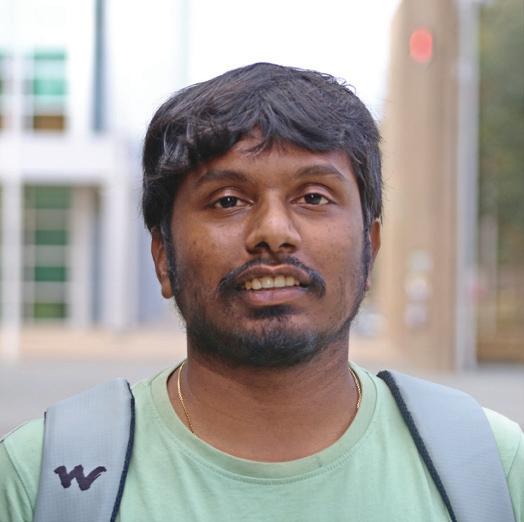

“I’m planning to visit family in Pakistan, so I’ll be traveling abroad.”
- Sana Khan, Biology Sophomore
Dec. 6, 2021 | The Mercury NEWS 7
PALAK DAVE Mercury Staff
JACKY CHAO MERCURY STAFF
ANNA PHENGSAKMUEANG | PHOTOGRAPHY EDITOR The mediation competition was held over Zoom, where Comets Hadia Siddiqui and Ifunanya Pugh were chosen to compete in the final round of the competition.
SEE MEDIATION, PAGE 4
UTD ALUMnus PUTS NEW SPIN ON LGS FORMULA Innocence Project
Owner of Mystery MTG delivers shiny cardboard to customers just the way they like it - with more
BEN NGUYEN Managing Editor
A UTD alum is changing the way that trading card game players consume their so-called “cardboard crack” with a non-traditional LGS model and a focus on customer experience.

Alan Hussein is a UTD alum running the Mystery MTG card shop. He started it two years ago as a fully online retailer, wanting to change the way that people engaged with local game stores. A passionate MTG player himself, he wanted to start a business in a field he was interested in after leaving his previous company.
“What business do I think I would be passionate about? … Obviously it was a local game store. And we wanted to do it riskier, cooler, sexier than any game store that’s ever been started,” Hussein said. “We’ve quickly become one of the largest subscription-based companies for Magic the Gathering in North America, if not the world.”
And how is Mystery MTG the “sexier” game store? In comparison to most other stores, Mystery MTG offers a monthly crate service, similar to Loot Crate, that ships customers a package filled with different packs from various Magic sets as well as high value singles. One of the differences between Mystery MTG’s subscription service and other similar monthly services is a high guaranteed minimum value for the contents of each crate.
Buyers are guaranteed an 80% minimum value for the contents of any crate, and with the way that the MTG market is trending, crates that are shipped out by Mystery MTG will generally appreciate in value over time.
So, Hussein says that the prospect of opening older and rarer packs for a fraction of the price every month is appealing to players.
“The majority of our customers over the span of the year make money subscribing to our service because we send out the oldest, the most rare products in combination with newer products. So, there is a risk, but at the same time, there’s a huge allure to that.
Do you want to open a product from 2001, 2004, 1998? You do, and sometimes you don’t care what you get. Because that’s a nostalgic takeback to that time,” Hussein said.
“Now that you have the disposable income and you want to do that, you have a couple of options. Are you willing to buy that box worth a thousand dollars, or will you subscribe to us for 39 dollars a month and we’ll send you packs of the sets that you want?
That’s the way it works, and people love it.”
Even though there is a high guaranteed minimum value on each crate, Mystery MTG still makes money off the crates since not all crates are created equally. On top of this, they gain revenue through the general sale of single cards, board games and other related products. However, they also run raffles and sell specialty higher-value crates, and while they are running these at a loss, Hussein said they’re integral to sustaining their high customer retention.
“What it does though, when you get something that amazes you, is you become a long-term customer for that service. Our customers are die-hard. We’re one of the only services that have an 80% customer return rate,” Hussein said. “We have a very high average spend rate per customer. They like what they get, they know what they’re getting and there’s the verified authenticity aspect to it
too.”
Soon, Mystery MTG will expand into a physical location on Campbell and Coit. Hussein has high aspirations for the space, from planning large MTG Arena esports events to hosting large in-person Magic events for thousands of players. Other stores have had their own challenges with Magic, with The Local Game Store notably not running Magic events on their schedule. Coowner Kyle Waple said that players are reluctant to leave stores they’ve been playing at for up to five or even 10 years. Hussein, however, said he’s prepared to attract a large audience to his location.
“Even with just our online services, we make more money per month than almost any other LGS, outside of Madness, in Texas. So, we already pull the majority of these
alums reunited as public defenders
RNG ALEENA HASSAN Mercury Staff
San Diego native Blake Eaton knew he wanted to be a lawyer ever since he was in middle school. After enrolling at UTD, he quickly became involved in Moot Court, Mock Trial and the Innocence Project — an initiative to exonerate wrongly convicted individuals. Today, he works alongside two other UTD alums in the San Diego Federal Defender’s office.
Magic players, and it’s because we do the craziest theme crates. We have just, a very exciting offering of products, and I think that these other LGS’s do everything in a very boring way. They are the exact same LGS that you walked into 20 years ago, and that’s why people are not coming back,” Hussein said. “They either align themselves with being a premium store or align themselves with being an affordable budget store. … I think a lot of people are looking for a store like ours where you are able to experience RNG in a way that you haven’t experienced before.”
With a physical location within walking distance of campus, Hussein wants the store to have all products on the shelves or available to purchase in-store, including the monthly
“A few years before I started college, there was a case regarding Cameron Todd Willingham in Texas. He was convicted and executed for setting a fire in a shed or something like that, which killed his children,” Eaton said. “For whatever reason, they thought it was deliberately set. They had this arson expert testify about patterns of the burn that only happen when you have an intentionally set burn, but since then, and since the state murdered him, the evidence is very convincing that it was an electrical fire or something completely accidental. He did not do it.”
At UTD, the Innocence Project is a class where students look at records from criminal cases and see if there’s a possibility that the defendant might be innocent. Eaton and other students in the class had to go beyond the normal legal issues and try to find other ways to prove that the defendants were innocent even after being convicted beyond a reasonable doubt.
“I think the biggest takeaway from [the class] was that you’ve got to get it right the first time,” Eaton said. “It got me thinking… you cannot just avoid messing up someone’s life, but you can actually do things that change the outcome for them. You're actually
Ask Sophie: When should I take a break? How Russia got turned upside down
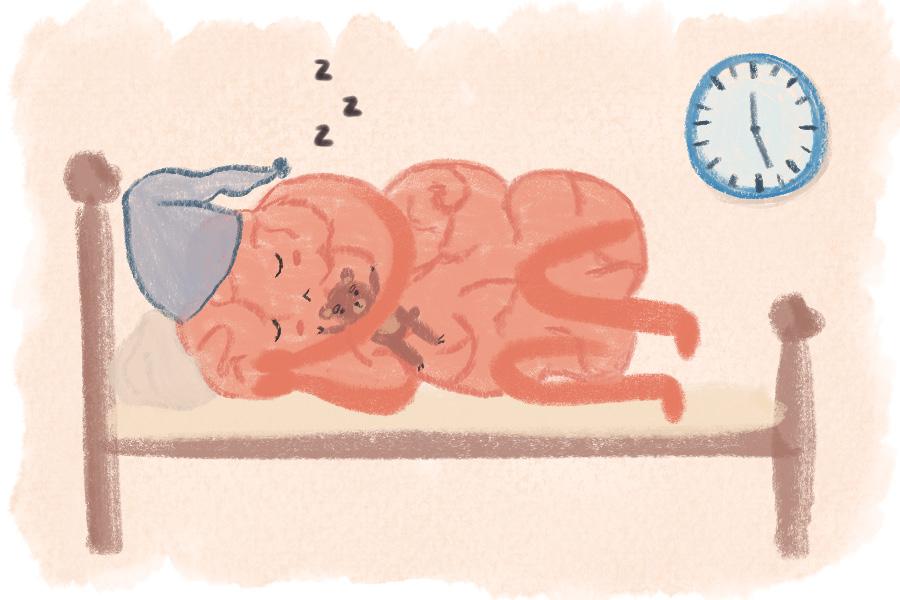
There are two types of students in this world: those who spend their winter break sleeping and exploring the depths of Netflix and those who spend it catching up on work. While the bulk of UTD students probably fall in the latter category, devoting too much of your time off to work can be just as debilitating as letting your brain turn to mush.
I can already picture it: Overachieving Comets fill their vacation schedules with MCAT, LSAT or GRE prep or applying to jobs or internships, and the UTD subreddit is flooded with rant posts about how yet another winter break was dominated by work. While yes, it can be helpful to knock out some academic tasks over the break, you don’t have to let these objectives consume you and erode your mental health. Instead, recognize that more of your winter break (at least half of it) should be dedicated to actually taking a break from school and recuperating from all the challenges of this semester.
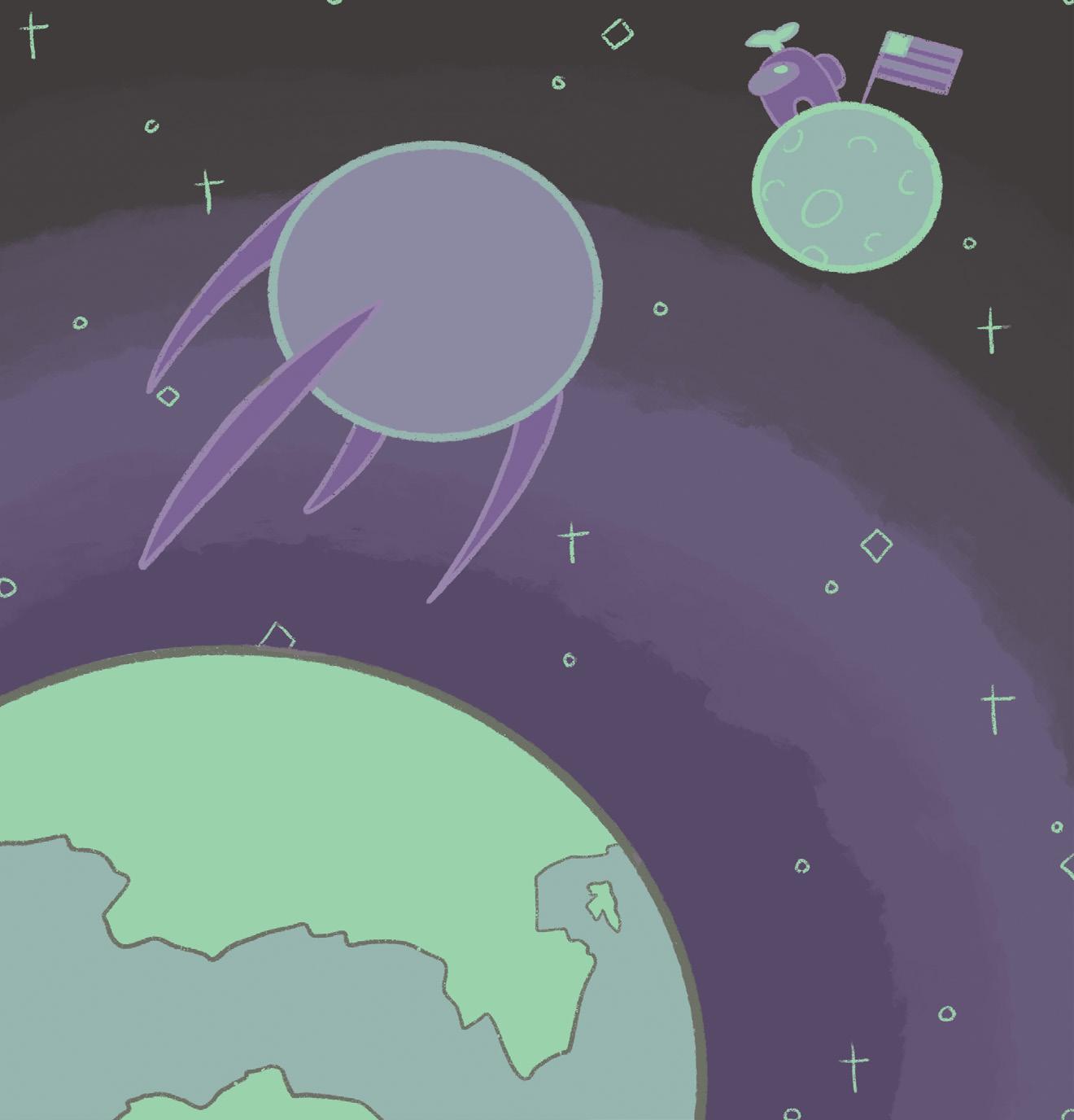
With virtual classes and less structured working hours, if you don’t advocate for your own well-being, no one else will. You could very well spend your entire winter break studying or working incessantly, but in this productivity-focused, money-and powerhungry society, people who benefit from your work will continue to ask you for it. And the moment you are recognized by a professor or a supervisor for a job well done, you may feel more inclined toward productivity at the expense of your mental health.
So, practice saying no to school and
other obligations, and set limits for work when you are granted time off. If you have trouble doing this, start with some easy, low-risk situations. Say no when your friends or family want to go out but you’d rather stay home. Say no when a coworker asks you to cover their shift last minute. You could even go into a room by yourself and say no out loud five times. It may sound pointless, but being able to say no when needed is necessary to fully enjoy your breaks.
If your self-worth is contingent upon your academic performance, saying no may feel like a missed opportunity to advance your knowledge. But instead of agonizing over the chances you did not take while out of school, view your time off as necessary for future success.
Perhaps you need to catch up on sleep, binge-watch an entire Netflix series or chat away with friends and family to feel rested enough for next semester.
You’re not entirely writing off academics – you’re just prioritizing the activities that will help you recharge for later tasks.

You don’t have to jump from hard-
core studying to full relaxation mode on the first day of the break, though. It can be difficult for your brain to switch gears suddenly, so ease into your vacation by starting with activities that feel constructive but are still restful. Pick up a new hobby or skill, experiment with new recipes in the kitchen or finally get to that book you’ve been wanting to read. Different activities appear productive to different people, but really any action that provides you the space to recharge is a good use of time. So – go for a walk, cook a healthy meal from scratch, play with your pet, take a hot bath or discover new music. Put whatever activities you love but have regularly pushed off your schedule back onto your calendar for this winter break. Carve out a specific time for your favorite things just like you would for studying. Physically write it or type it on your calendar, commit to it and then observe what happens. You may find that your renewed focus makes you better equipped than ever for your classes next semester.
Thanks, UTD PD! First of all, for jumping my car battery so I could get home for Thanksgiving. Second, for the officer who explained his deep and abiding hatred of Russia and everything it stood for when I answered his, “Hey, what are you reading?” conversation starter. He had particularly strong words for Vladimir Putin (and China, but we’ll come back to that later). Before that exchange, I was reading Joe Weisberg’s latest novel — and first venture into nonfiction — from a fairly detached perspective. I’m Gen Z. I don’t remember 9/11, nevermind the Soviet Union.
That officer’s reaction, however, put things into perspective. Weisberg’s take on thawing out Russian-American relations remains controversial, with the “evil empire” still standing and often directly undermining U.S. interests. However, the ex-CIA trainee and “The Americans” creator argues, the comfortable split of us-versus-them, capitalists and
communists, good and evil, is not only out of step with reality but risks getting us into a catastrophic conflict. And lest you think his creative credentials are in want of a foreign policy overhaul, Weisberg's got back-cover recommendations from former CIA chiefs and Russian operatives alike.
Alright, so the argument’s convincing. But how do I persuade you to read this book, barring a shared nerdiness for foreign policy deep-dives? Easy. Weisberg is an award-winning television writer for a reason. The man knows how to hook an audience and keep them interested, no matter the subject. His unique blend of comedy and spot-on explanation makes it an excellent read for anyone…maybe too excellent, actually, as I had a hard time putting it down to study for finals.
Between binging this and “Arcane,” I’ll have to start using “Cs get degrees” as a daily affirmation.
This book also occupies that very specific niche of nonfiction that’s a fascinating fu-
Dec. 6, 2021 | The Mercury LIFE & ARTS 8
BEN NGUYEN | MANAGING EDITOR
Mystery MTG owner Alan Hussein handed out some "Christmas Crates" in person on campus, each with it's own Christmas bonus attached on the back.
Is the Cold War microwavable? Weisberg’s nonfic debut wants to throw away the leftover mentalities MARGARET MOORE Mercury Staff SEE DEFENDER, PAGE 10 ELIZABETH NGUYEN | MERCURY STAFF Weisberg's first non-fiction exploration details the potential consequences on the United States of America's foreign policy with rival Russia post-Cold War period.
SOPHIE BOUTOUIS Copy Editor
SEE MYSTERY, PAGE 10
RUSSIA, PAGE 10
DANIELLE BELL MERCURY STAFF
SEE
UTD's ESPORTS PROGRAM NEEDS MORE PERMANENT SUPPORT
After its explosive success and growth in a short time the esports program needs more permanent staff in order to sustain current operations.
The UTD Esports team has outgrown the administration’s current support, and needs another permanent staff member to keep the program’s momentum going or it risks losing the progress the program has made so far.
The interim period since inaugural coach Greg Adler left the program has both shown off the highest that the esports program could achieve and exposed the flaws with the current administrative situation. As an example, the Overwatch team brought on former pro coach Chris “Bani” Benell and freshman players such as Abraham “P3tal” Khan, giving them an edge that pushed the team to top 4 in the nation. The social media team and broadcast team also expanded to some degree, but this reveals some of the flaws in the program. As it has rapidly expanded into 4 different games and multiple domains of esports beyond mere competition, UTD Esports has quickly outpaced both the passion driving the program forward and the support that the administration is willing to give it.
The esports industry was historically driven by passionate and underpaid people striving for a dream. This manifested into unpaid horror stories, like Dignitas paying interns in mousepads for months of work. Unfortunately, collegiate esports doesn’t fall far from the tree. It can be argued that like many other collegiate clubs, an esports program doesn’t necessarily have to pay students for doing some minor work or social media promotion. Officers at smaller clubs may dedicate 5-10 hours weekly to arranging meetings, activities, and managing a small budget funded by bake sales. However, this type of view grossly underestimates the current scale of the program, and likely was a contributing factor to the University’s disastrous decision to list a director’s job as a “head coach” position. Perpetuating this view only leads to the continuation of one of esports’ worst habits, and it will eventually burn out the most passionate people in a program.

In the absence of permanent paid employees by the university, UTD Esports has fleshed itself out with a program that is almost entirely student run. Teams needed
coaches to coach teams, so volunteers were found. Then team managers were needed to arrange practices and tournament signups, alongside more coaches to help the existing ones in a growing program. More students joined the program. Real esports teams have social media, so a social media manager manifested, and so on and so forth until there’s nearly 20 students filling roles that are paid positions elsewhere, from coaching to broadcast and more. The key students of the program can spend up to 40 hours a week keeping the program running to the standard they’ve set, because they want to see this program succeed. But it’s not sustainable. Students are ephemeral by nature. They graduate, get new jobs and some just become burnt out.
This is especially obvious with the social media team, which this semester was a revolving door. Long-time social lead and CS major Hector Mavrakis graduates this year, and did a lot of work on graphics, social media, and sponsorships – often far exceeding his logged 20 hours a week. He did so much on the team that his position is breaking into three different roles upon his graduation, all of which need to be filled for the social media team to continue running at tip top shape. And while early in the semester there were plenty of people willing to help, like with all clubs, membership tends to die down over time. At this time, only one full time video editor and one full time social media person remain.
Critically, for an esports team, social media can be a key aspect of funding. Every single esports team, collegiate, amateur, or professional, runs on sponsors. And differently from sponsors for traditional athletics, they don’t just want their names plastered on the jerseys or arena walls. Esports sponsors love deliverables: social media content that features their product, direct promotion in the beginning or end of a video, or even just featuring their logo in exchange for funding the content piece.
“There could potentially be a little more support and hours given so that we can bring on more students … for the marketing team so that we can offer more deliverables. More deliverables means that we can also have more content for sponsors,” Mavrakis said. “Just take creative and socials as a potential money maker, it’s been proven
with universities such as UCI that esports can 100% be profitable.” UTD Esports has a lot of problems to address. But all change must be made incrementally. So, even though the name “head coach” is wholly inaccurate to the duties of the position, and even though students will have to pick up the slack in the day to day operations of the teams since, as a public institution, UTD can’t just throw money at what we’d like, I propose one solution. Within a year, the administration should hire on at least one other permanent staff member to maintain a constant presence for the non-player related parts of the program: the social media, broadcast and content creator teams. Because social media and broadcast are so key to providing marketable deliverables, potentially multi-year sponsorships should not be left up to students that leave on a semesterly basis. Having a permanent esports media coordinator on deck to oversee the funding and creation
of deliverables – which can be made by available student staff – would greatly stabilize the program. A big complaint from the program right now is that there is not
enough money to pay for equipment, staff work, and more. A summarization of the admin response is best said as “this is the worst time to be asking for money.” But having somebody on staff focused on coordinating the social media and broadcast team can cascade into securing sponsorships and funding for the program and free up the new “head coach” to focus on managing the teams. Then, the UTD administration doesn’t have to inject hundreds of thousands of dollars to meet program demands and the program itself can become self-sustaining.
This video, for instance, is plastered with Alienware’s logo in the start and end, since the company is one Team Liquid’s main sponsors.

The members of the esports program have already proven that success can be achieved here. From smashing the collegiate smash scene to garnering over 90,000 views on roster announcements alone, the program is running strong on the fuel of student passion. But now UTD needs to strike while the iron is hot, or risk losing the program as burnt out students leave behind a dying flame.
Rewind your fantasy with the dark academia genre
More than an aesthetic, dark academia provides a way to indulge one's yearning for knowledge
Through a whimsical and eye-catching art style, Ben Hatke puts his own twist on the classic hero's journey in his three-part comic book series “Zita the Spacegirl.” Against an apocalyptic sci-fi backdrop, Hatke keeps things interesting by making the hero's journey one of redemption instead of self-discovery or lost innocence.
This series is a fun and heartwarming read that unlike some other comics, isn't super demanding of your time. While it is a threepart series, each book has a self-contained storyline and can be finished within a day.


The series begins with our main character Zita and her friend Joseph playing outside as a strange object falls from space. As the object plummets toward the ground, we are introduced to the attitudes of our protagonist and her foil. Zita is outgoing and short-sighted while Joseph is cautious and shy; Zita opts to press the red button on the fallen object even as Joseph tells her not to mess with it. This creates a small portal, and Joseph is dragged into another dimension by a strange creature. In a mix of shock and horror, Zita runs away as her friend calls out to her for help.

Guilt-ridden, Zita decides to embark on a
rescue mission. Once again pressing the red button from the strange space device, she leaps through the portal and embarks upon her galactic rescue mission, stranded on an apocalyptic planet with a cult that believes her friend is the key to stopping a meteorite from destroying the planet.
Now, what makes this comic book series so enjoyable is that the reader can literally see a shift in Zita’s attitude as her journey progresses. We see her go from having a trickster attitude to a team-minded one. For example, after jumping through the portal to search for her friend, Zita is faced with the realization that she’s alone in a foreign environment where everyone is hustling to get somewhere or get something. But, after a strange creature selflessly helps her navigate through a crowd when she first arrives on the new planet, she’s able to lend a helping hand to the planet’s inhabitants she later befriends in the story. Another example is when she and her crew are traveling through the ruins of a city. During their trip, they come across a robot whose legs no longer work, and Zita goes and finds a new pair for him instead of leaving him behind like one of her traveling companions wanted. Still, this newfound attitude is put to the test when Zita has to decide whether
SEE SPACE-GIRL, PAGE 10
Dark academia is more than just a TikTok trend — it provides a refreshing escape from our technology-obsessed lives as it romanticizes the pursuit of knowledge through literature, classic architecture and a gothic color scheme. Think blazers, pleated slacks and a novel clutched in your arms as you rush to your Greek classics class or write a letter to a loved one amidst the candlelight. Often people think about reading or completing schoolwork with a negative connotation, and I’m guilty of that as well. I mean, who actually appreciates staying up into the wee hours of the night writing a long essay about a topic they aren’t passionate about? Dark academia, however, is an aesthetic that glamorizes such tasks and reminds us that academia can be enthralling and exhilarating.
In this age of digital entertainment, it can be difficult to avoid looking at a screen 24/7. Spending your free time scrolling on your phone can be fun, but after a while, you feel lazy and as if you wasted your day. Romanticizing knowledge can make you pick up hobbies that feel productive and help you enjoy learning and the world to a fuller extent, as the dark academia subculture is pretty distant from the insipid digital world.

And while I read for enjoyment and think annotating pages of classics is fun, the pursuit of knowledge doesn’t have to be just this. It can also involve heading to an antique shop instead of a mall, starting a bullet journal or learning a new language. Doing activities such as these discredits the idea that learning is always serious and only about a numeric grade. Learning is enjoyable and facilitates a greater appreciation for the seemingly unexciting world around you.
The dark academia aesthetic is not merely a fashion statement. Instead, it is present in many forms of media such as literature and movies (past and present).
Dark academic content combines tragedy and gothic themes with an intense passion for literature, the arts and classics in a way that is wonderfully melodramatic but real. Most books or movies that fall in this genre usually involve crime, take place at some prestigious school and contain beautiful prose or dialogue.
A good example of dark academia and one of the most recognized dark academic works is the “Dead Poets Society.” A group of young men at a private academy delve into poetry and
literature in a way that makes them see the world with rose-colored lenses. Expectations of parents and the cruelty of reality cause tragedy to occur and eventually bring the characters grief. Because most dark academic works are far removed from technology, they have a timeless nature that intrigues all generations. Once you dive into this subculture through clothing, a novel or something else, you’ll be mystified by groups of charismatic scholars equipped in tweed, clutching their satchels filled with copies of “The Iliad” or “Macbeth,” spouting prose like second nature. Perhaps then, you'll be ready to convert to the dark side.
Zita provides light-hearted sci-fi fun
ELIZABETH NGUYEN MERCURY STAFF
Dec. 6, 2021 | The Mercury OPINION 9
CASEY RUBIO MERCURY STAFF
SIHANYA ROCHA Mercury Staff
BEN
NGUYEN Managing Editor
SIHANYA ROCHA | MERCURY STAFF
MIA NGUYEN Mercury Staff
BEN NGUYEN | MANAGING EDITOR
Update: - Met monthly with Vice President of Student Affairs Gene Fitch and discussed student concerns gauged from polls, surveys, UTD-affiliated apps and online sites and SG’s interaction with students. Met with Vice President of Diversity, Equity and Inclusion Yvette Pearson and the Committee for Support of Diversity and Equity to discuss student representation in DEI initiatives.
- Released surveys and petitions to gauge student interest and concerns. Surveys/petitions included those on commencement venue preferences, de-densification, classroom policy and a plastic ban.
- Implemented a disposable mask recycling bin initiative to recycle masks into raw material. Mask-recy-
an increase in the number of cases within the community — we will ask people to continue to do the Daily Health Check throughout the winter break — that may affect our decision on how we start the spring semester.”
Unlike the last two semesters, UTD will not test every student upon their return to campus in the spring. However, Martín says that does not mean that the Proactive Testing Program is over just yet.
“We are going to continue the Daily Health Check and Proactive Testing Program through the start of the spring semester, definitely
INTRAMURALS CONTINUED FROM PAGE 1
scenario happen, they stuck around. They were, I think, a lot of times just happy to be able to participate and have that camaraderie to compete or just try something new.”
Piper said that many of the changes that were made during the fall semester — such as running mini leagues for flag football and
TRACK CONTINUED FROM PAGE 1
training for different events, with team preparation beginning next semester in January. And because track events are so specialized, Kcholi said she’s in the process of recruiting another staffer to help train sprints, hurdles and jumps and is excited to
MEDIATION
cling bins were added to the Visitor’s Center, Bookstore Lobby, Student Union Lobby, Student Services Addition Lobby, Dining Hall West Lobby, Engineering and Computer Science West Atrium and Naveen Jindal School of Management Atrium. -
Hosted and assisted with voter registration events for unregistered students to partake in November local elections.
- Planning to host events and launch initiatives regarding student mental health, academic success, artistic talent and political engagement next semester, including the Mental Health Summit, academic success workshops for first year students, the Blank Space Art initiative and collaboration with local elected officials.
- Fell short in addressing issues of menstrual equity. Planning to
through January, and maybe longer if we think it’s warranted and we still have high levels of transmission in the North Texas area.”
While the same number of weekly tests will likely be administered in the spring — about 10% of the community — Martín said that the University is considering oversampling the portion of the community that has not registered its vaccination status in that pool, if community spread rates remain low.
“We know that they're at higher risk,” Martín said, “both for contracting and transmitting COVID-19. We would probably still continue to test a smaller portion of the registered population, because it's
soccer — were implemented while his department worked to get staffing numbers back up to pre-COVID levels.
“Probably like anybody else on campus after we came back, [there were] issues with resources in terms of facility space or having the manpower to be able to do some things with your programs that you used to do or wanted to do wasn’t there —
see how some of the track-specific recruits will fare this year.
“I’m excited to see what this group can do on the track now. I brought in some really strong middle-distance guys, and we’re going to hopefully continue to dominate at the distance events. But I really love track because it provides the opportunity for you to
propose a long-term and sustainable menstrual equity initiative inspired by practices at other Texas universities next semester.
Promise 3: Ensure students have the necessary resources for a safe return to campus Update:
- Advocated for students to partake in COVID-19 safe practices such as mask-wearing, social distancing and getting vaccinated.
- Worked with administration to keep the Comets United page up to date. Working with administration currently for the page to reflect information on receiving COVID-19 vaccine boosters through the Student Health Center.
- Planning to work with Comet Cupboard to raise money toward easing food insecurity during the holiday season.
a much larger number, and we want to make sure that we are catching any breakthrough cases or spikes in that population. That's one option about how we might tweak the Proactive Testing Program. But as of right now, the plan is just to kind of roll into the spring semester with a 10% sample of the whole population weekly.”
One other change that may be implemented is the introduction of seating charts to classrooms — an initiative that Martín credits Student Government with advocating for.
“[This semester] we could've saved ourselves a lot of time and labor if we had better seating charts in the classrooms for when we got a report in a classroom environment, to be able
specifically staffing was an issue,” he said.
There was no one on staff to officiate at the start of the fall semester, and while the number has grown, UREC is still hiring more students. Piper said that officiating intramural sports can be a tough job since it requires thick skin, adaptability and the ability to learn the sport quickly. Recruiting was especially difficult
really hone in on your skills: instead of just having the 5k or 6k, you can really get into your niche.”
Kcholi says the goals for this year are simply to perform in the events she can field competitors in, as UTD works to round out its track and field team and place competitors in more events.
resonates.”
Promise 4: Bridge the gap between pre- and post-COVID in SG Update:
- Continuing SG initiatives proposed pre-COVID, such as focusing on and maintaining the DEI SG Committee and launching the Blank Space Art initiative next semester to display student artwork in the Student Union and eventually around campus.
- Polled senators to gather data on their knowledge of SG’s process to gauge how to best help senators transition into their roles. SG plans to provide further resources and guidance to newer SG members using the results.
“We’ve really wanted to focus on rebuilding the foundation of SG coming back from COVID. … A lot of it has been getting things back in motion and making sure that at the very
to identify who the close contacts were of the positive case and be able to target our resources much more efficiently. If you print out a blank form at the start of class, hand it out and have people fill in where they’re sitting — that then gives you a paper record faculty can retain if emergency management says, ‘Hey, there was a close contact in your class on this date.’ So, I'm going to be talking with the provost and the president about making that a mandatory protocol for the spring semester.”
On-campus quarantine housing will remain available for students who test positive or report symptoms and require accommodation. However, Martín said that there was a
this year since students haven’t had much visibility into the program in the last couple of years.
“There’s no one, single focus [to recruitment]; it’s kind of a compilation of things, but the easiest way if somebody’s interested is to reach out to us and we’ll set them up and go from there,” Piper said.
Since COVID-19 positivity and transmission rates on campus have
“We’re also going to try out some new events this year. We’ll stick some people in steeplechase; I brought a couple of sprinters in, and on the men’s side, we have one thrower too. We have some really strong middledistance runners on the women’s side too, and overall, our goal is to do what we did last year: score really
least, our senators are aware of what is possible and what the process looks like this semester. Hopefully, when [senators] are in our shoes two, three years from now, they have this experience to help guide them,” Short said.
Promise 5: Provide adequate communication about SG and campus to students
Update:
- Presented bi-weekly COVID-19 updates at Senate meetings.
- Communications Committee worked through SG’s social media (primarily Instagram) to connect with students, showcase events on campus and provide campus and SG updates including those related to UTD’s COVID-19 dashboard, Texas constitutional amendments, the TechKNOWledgy Bar, UTD Grades and SG election results, among other things.
trend of students returning home for their quarantine period this semester rather than choosing to remain on campus. Accordingly, Associate Vice President of Student Affairs Matt Grief said there will be 10 housing units in CCHN — and 10 additional units in UV — reserved as quarantine residences. The peak occupancy this fall was 19 students quarantining on campus.
Since UTD released an update to the Voluntary Vaccine Report Form on Nov. 8, OEMCP reports that 15.29% of staff and faculty have reported receiving a vaccine booster, whereas only 2.29% of students have so far. That number will likely go up as boosters become more widely
remained low, Piper said he doesn’t anticipate needing to adjust the formats of intramurals, but his department is prepared to do so if necessary.
“The good news is, a lot of departments on campus and across the country are now in that mode where if we have to take a different approach based on some new information that’s come down, we’re pretty much ready to do that,” Piper said.
well in the events we participate in and keep building on that until eventually, we get to a point where we can compete for a championship.”
Another advantage of the track season, Kcholi said, is that most of the meets the Comets will be running in are relatively close to campus: in March and April, they have meets
- Planning to host regular tabling sessions next semester for students to learn about SG and campus, and for students to approach senators with their concerns.
Promise 6: Increase collaboration between SG and student organizations
Update: - Sponsored and/or hosted events in collaboration with student organizations. Events included National Coming Out Day, the Mental Health Week student panel, the SG and RHA Pumpkin Painting and the SG and GSA Blood Drive, among others.
- Planning to spearhead the President’s lunch — a student organizational leader meeting — next semester to connect with and discuss collaborations between SG and student organizations for future events.
available. In fact, Martín said that the Student Health Center is currently working on establishing a system to deliver booster shots to eligible students on campus, but more information will be provided as the details are finalized.
“Overall, I feel like we have done a good job — not a perfect one, but a really good job — this semester. I credit that to the high vaccination rates we have on campus,” Martín said. “We’ve got to continue to be vigilant. We don’t know if Omicron is going to show up here, and if so, how effective vaccines will be, so we hope the community will continue to do everything we can to keep each other safe.”
Registration for the intramural programs that occur early in the semester – including the basketball league – will open on Jan. 3. Specific schedules and registration information will be available on the IMLeagues website.
“We’re happy to get back to where we were before, and hopefully the students are and will show up coming off of that as well,” Piper said.
in Tyler, Commerce and Abilene –where the ASC championships will also happen, come May.
“Since we’re staying pretty close, it would be awesome if people could come out and maybe support us if they can make it,” Kcholi said. “It would be great to see some Comets there!”
under his tenure as coach – lies in the realistic approach the team takes to mediating.
“I am a practicing attorney,” Seagroves said. “I go to me-
DEFENDER CONTINUED FROM PAGE 8
CONTINUED FROM PAGE 7 a positive influence on what happens, and that's what I try to do as an attorney.”
While at UTD, Eaton befriended Theo Torres, a fellow pre-law student and freshman suitemate. They took the Innocence Project class and worked on cases together. Eaton and Torres credit their time in the Innocence Project with broadening their understanding of the criminal justice system and the role of public defenders.
RUSSIA
CONTINUED FROM PAGE 8
sion of the author’s subject material and personal life. “Russia Upside Down” is as much of an exploration of psychology as it is of political tensions. The third chapter is quite accurately titled “Therapy.” A warning for anyone who hasn’t yet carefully examined how their political views are shaped by their personal experiences is due here, as Weisberg pulls zero punches in examining
SPACE-GIRL CONTINUED FROM PAGE 9
to continue her journey to save her friend Joseph or leave the planet with her new friends before the asteroid hits. This
diations, so I try to teach [the students] what a real mediation is going to be like. And the judges are real attorneys, real mediators and real judges – so when they go in there and act as if they’ve done this before, I think that
“You go in with sort of the thought, ‘Oh, I'm going to get this innocent person out of prison.’ Like it's just like a movie. That's an idealized version of what it really is,” Torres said. “Looking at trial transcripts, there's a lot of ambiguity. It's not clear that this person did it or didn't and you're left with a lot of doubts going either way. What I came to understand throughout doing this for a couple of years was that the system operates in such a way that it brutalizes people, regardless of whether they did or didn't do the
how his upbringing influenced his current opinions. Perhaps, take a self-reflection break there before reading on — I sure did. But once you accept that level of self-awareness and openness to change, the rest of the book’s brick-by-brick teardown of American assumptions regarding life in the Soviet Union and overall relations toward Russia will hit any preconceived biases like a sledgehammer. This is one of the strongest points of the book, in my opinion.
personal test first pops up in the middle of the story and then again towards the end.
Character development aside, the author's use of a soft pastel color palette does a great job of
Seagroves also emphasized that the lessons he teaches apply to far more than acquiring collegiate accolades.
“What I tell [students] is that if you’re going to go onto the
thing they're accused of.”
After graduation, the two went to different law schools — the University of Chicago and Yale, respectively. But their paths crossed again when they later found themselves working at Federal Defenders of San Diego. There, they met another UTD alum, Zainab Khan.
As a student, Khan was vice president of the John Marshall Pre-Law Society, and after graduation, she attended SMU’s Dedman School of Law. While there, she worked at the Constitutional
Weisberg lays out a battle plan for winning you over by tracing the paths that changed his own mind. Extraordinarily nuanced subjects are given excellent explanations that respect their complexity while still delivering blisteringly clear takes like, “To be consistent, if we choose to see only the terrible things the KGB did, we should look only at the terrible things the CIA did too. But if we see the CIA as complex, with good and bad sides, we have to do it for
keeping the tone energetic and friendly. The comic also has an art style that balances simplicity with detail, making the diverse creatures and backgrounds of planet Zita visually enjoyable
courtroom, the boardroom, the operating room, or wherever you end up – if two or more people are involved in a project, you need to know how to negotiate,” Seagroves said. “There’s always going to be some sort of conflict.”
Law Center for Muslims in America – an experience, she said, that solidified her choice to become a public defender. In 2018, she became the first hijabi trial attorney in the country to work at a federal public defender’s office.
“I think my hijab had always been an issue in terms of like, how will I represent people from my own community or other people? Will it have a negative impact? You definitely have to have a strong sense of self,” Khan said.
Today, the three former Comets work on immigration cases that
everyone." This man takes around 70 years of rivalry and moral posturing out behind the shed with a rifle and comes back with a story about a farm upstate.
In the interest of the very selfawareness he advocates for, I acknowledge this review sounds like I’m equating U.S. and Soviet actions throughout the Cold War. Weisberg provides about 200 pages of detailed analysis on each of these points with individual citations and all the
regardless of whether there is action in the panels. This combination of friendly and energetic pastels with an engaging art style gives “Zita the Spacegirl” an innocent warmth, de -
He concluded by extending an invitation for more UTD students to get involved.
“The mediation program is housed under the Department of Undergraduate Education. There’s no prerequisites to join. Every
typically involve illegal re-entry, smuggling and drugs.
“I remember sitting in law school and in my first couple of classes for criminal law, there was this statistic where it said more Black people are in jail now than were ever enslaved in the United States,” Khan said. “So when I look at drug laws, they have really, really harsh penalties, and I don't think that's okay, especially when you look at like the type of people that are being prosecuted.”
Reflecting on their experiences, all three said UTD and the Inno-
fervor of a man who’s successfully planned six seasons of a high-stakes spy thriller on primetime television. I don’t think my writing skills are up to task with communicating that, especially during this finals crunch. All I can do is point you in his direction.
But when you consider the policy implications of that acknowledgment, things become really interesting. After all, reframing U.S.-Russian relations
spite the story’s pre-apocalyptic premise.
If you are looking to pick up a new series but have a busy schedule or want to read something that isn’t convoluted and
fall, once the semester begins, I have students contact me, I put them on a list and I reach back out to the interested students right before preparation begins, giving out spots based on availability.”
cent Project played a valuable role in where they are today.
“I think a lot of people who are not involved in the [judicial] system think that its primary function should be sorting the guilty from the innocent. But once you start scratching at each one of these cases, you saw something wrong, something being done incorrectly,” Torres said. “Working with the Innocence Project class was just really eye-opening in so many ways. I definitely think it was a key factor in making me the kind of lawyer I am now.”
and undoing Cold War hostility isn’t something that stops at the Iron Curtain. What other international actors do we turn our noses up at in the name of values and decency? When China — told you we’d circle back — is increasingly said to be a new Soviet-type enemy, the “them” to our “us,” what can we learn from our Red Scare missteps? If Weisberg is to be believed, we have more in common than we do apart, and that includes a future. With a case as
text-heavy, “Zita the Spacegirl” is the series for you. We could all use a little bit more fun, light reading in our lives, so go pick up a copy at your local library or bookstore today.
Dec. 6, 2021 | The Mercury NEWS 10
PROMISES CONTINUED FROM PAGE 1
PROCEDURES CONTINUED FROM PAGE 1

































































